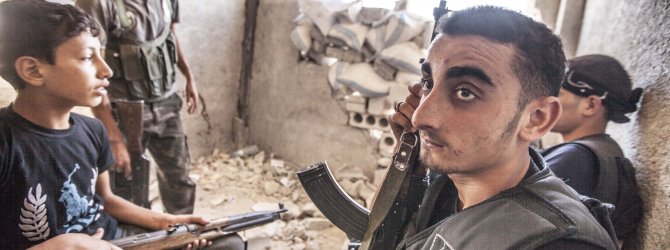-
What's Inspiring WANA: If you read one book on ...
What's Inspiring WANA: If you read one book on radicalisation in 2016, let it be this one

“I had always been taught – and had passionately believed – that the presence of Islamism meant justice, and the absence of it created injustice. But now I began seeing things differently.” – Radical, Maajid Nawaz
In Radical, Maajid Nawaz takes the reader on a journey from growing up in Essex, detailing the racism he experienced and his conversion into an active Hizb ut-Tahrir member (HT is a radical organisation that aims to establish an Islamic Caliphate, see this primer here). He goes on to describe his work with HT in England, Pakistan, Denmark and finally Egypt, where he spent four years in an Egyptian prison. The book covers his transformation into a campaigner against extremism, co-founding counter-radicalisation think tank Quilliam.
As the Coalition against Daesh steps up its efforts in Syria and Iraq, I believe that reading Radical is more important now than ever. Why? Because we don’t yet fully understand the processes driving recruitment to radical groups, and we know even less about de-radicalisation: how we might encourage members of violent radical groups (like Daesh, like Al Nusra) to turn their backs on extremist ideology and re-integrate into society. Daesh has been the most effective radical groups in history in terms of recruitment; according to Scott Atran it possesses “the largest and most diverse volunteer fighting force since the Second World War”. What are the reasons Daesh is so attractive? Is it because recruits are seeking to become heroes, as Atran argues, or is it because of a desire for social justice, as a 2015 Mercy Corps report suggests, or, in the case of Western foreign fighters, a product of the failure of pluralism?
Radical details how a “hip-hop B-boy” became radicalised and then eventually de-radicalised. Drivers for his radicalisation included racism, which left him vulnerable to HT recruiters. “If you haven’t felt the fear and helplessness that violent, organized racism makes you feel, it’s difficult to understand,” he notes, adding that HT sessions viewing videos of violence in Bosnia was a key point in his transition: “Southend, Gaza, Bosnia, Iraq, India: wherever you went in the world, the story was the same – Muslims were unprotected and under attack…”.
After a stint in Pakistan, Maajid was stationed in Alexandria, where he was to revive the Egyptian branch of HT. However because of his involvement in the group he was arrested by the security services and tortured. While being interrogated he became known as a number, number 42 or itnain wa arba’een in Arabic. During this period of incarceration, the call to prayer was the only way he could gauge the passing of time.
Some are radicalised in prison; but Maajid was de-radicalised in prison. In Mazrah Tora he was held with other political prisoners, Islamists, liberals and even gay men arrested in the infamous Queen Boat case; “…imagine if you can the dynamics between the jihadists and those from the Queen Boat case,’ he comments wryly. Amnesty International took him on as a Prisoner of Conscience, and he saw this as a key part of becoming “re-humanised.” Additionally, talking to other prisoners, who didn’t hold his beliefs was useful, as was committing to understanding the Qu’ran. “That dark period of solitary confinement, when I had vowed to become a suicide bomber, now seemed like the thoughts of a distant madman.”
Maajid believes it is when you start to lose faith in a group’s leaders, and to query their tactics and strategy, that the de-radicalisation process can take root. This fits with the experience of some Jordanians who have joined Daesh and Al Nusra. In From Jordan to Jihad Mercy Corp details how the principal rationale given by Jordanian foreign fighters was that they wanted “to protect Sunni women and children”. However the experiences of some fighters showed that the reality they had been sold by the organisation was not the same as what was happening on the ground. That Daesh and Al Nusra were fighting other Sunni groups indeed encouraged some Jordanians to return home.
Maajid’s story is one of grievance. If this is one of the drivers of the violent radicalisation we are seeing today, and I think this is at least part of the story, then the Coalition might want to rethink its strategy. Airstrikes that create civilian causalities may actually fuel grievances, and drive more people into the arms of these groups.
Maajid has contributed immensely to the debate on Islamism, democracy and radicalisation both in the UK and abroad. One example is a letter to foreign fighters encouraging them to leave Daesh and to return home. In it he pledges: “If you take one step to the good, we will all make leaps towards you. That is a promise. I have not given up on you. To do so would have been to give up on myself.” Radical is a gripping read, but more than that it reaffirms our common humanity.

